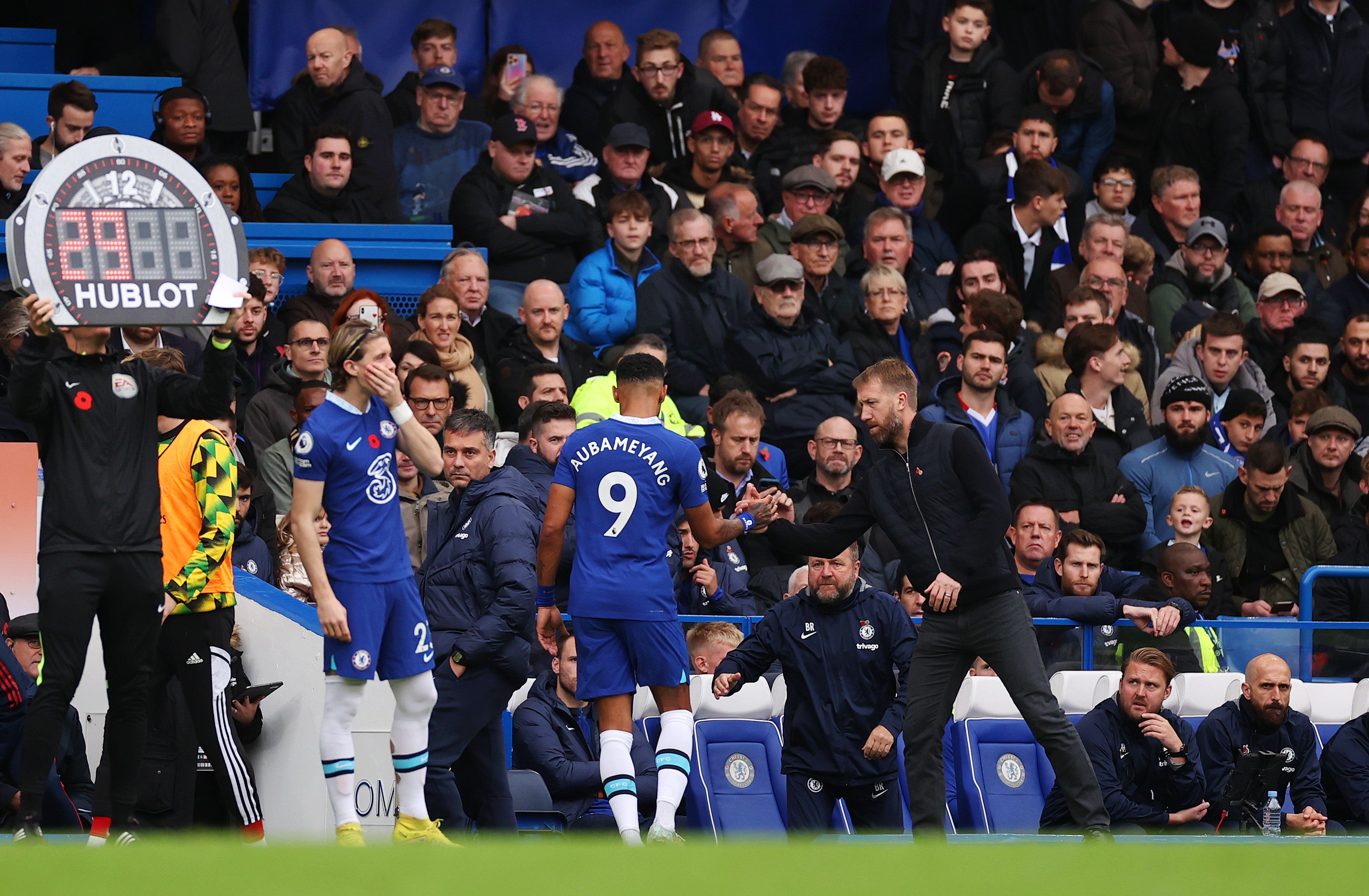
Vindication and victory almost came cloaked in perfection for Mikel Arteta. Almost, because as Pierre-Emerick Aubameyang trotted off in the 63rd minute after an utterly ineffectual display in a reunion with the club who rejected him, Gabriel had just put Arsenal ahead. It was Gabriel Magalhaes, admittedly, and not Gabriel Jesus, the anti-Aubameyang, the belated replacement for the man Arsenal exiled to Barcelona only to see him reappear in London.
But it was, as their fans sang, one-nil to The Arsenal. There was another scoreline, less significant but nonetheless revealing of Arteta’s ethos: 37-8. Jesus had mustered 37 touches by the time the other No 9 departed, Aubameyang just eight. It was the fewest on the pitch and if that is unsurprising – he comes from the breed of forward who lingers on the fringes of games, whereas the hyperactive Jesus prefers a greater level of involvement – he took anonymity to new levels.
Or, arguably, familiar levels for Chelsea, given Romelu Lukaku infamously played the full 90 minutes in last season’s game against Crystal Palace and mustered a mere seven. The highly paid spectators at Stamford Bridge are not all found in the executive boxes.
As long as parity was preserved, Arsenal may have wondered if the more clinical Aubameyang would have scored with a header that Jesus flashed wide. The trade-off with the Gabonese is that a greater proportion of his touches tend to be goals, but not recently. Aubameyang’s first match against Arsenal was a seventh in a row without scoring.
Even his most prominent contributions did not involve the ball; he was booed and abused. Supporters took a side in Arsenal’s civil war. Their last captain to lift a major trophy, the scorer of an FA Cup-winning brace against Chelsea, was greeted with various chants containing different expletives. It displayed where their sympathies lay. A controversial decision to exile him has come to be seen as a catalyst for progress and a victory that restored Arsenal to the top of the table felt their biggest statement result so far.
Aubameyang’s impact was felt largely by Ben White. He had touched the ball twice in 26 minutes before he missed it again when chopping down an old teammate to collect a caution. As he called for a red card, it was not the first time an angry Arteta showed an unforgiving attitude towards his former skipper. Aubameyang was up to four touches by half-time, when everyone else had managed at least 15. His lone shot came in the second half. It was blocked by William Saliba. He was going to come off with Chelsea level and instead did when they trailed.
In his defence, he felt miscast by a manager who did not sign him. Aubameyang could be deadly for Arteta’s Arsenal when cutting in from the left flank. Graham Potter used him in a sufficiently wide role that he was not really deployed as a striker at all.
In Potterworld, where everyone is a potential wing-back, for once no one was a wing-back. Ralf Rangnick’s influence on the Premier League has been indirect, and very little of it is felt at Manchester United, but Potter borrowed from the German’s blueprint. He picked a Rangnickesque 4-2-2-2, even if it was a shifting shape, in typical Potter style.
But, not for the first time, it was tempting to ponder who benefited. Kai Havertz should have done: found in space in the final third time and again, just unable to use it profitably, an inconsistent performer for three different managers, he remains Chelsea’s great enigma.
He was supposed to be the future of their forward line whereas Aubameyang was Thomas Tuchel’s quick fix. He has rarely fitted the profile of a Potter player. His defining skill is a talent his new manager undervalues: scoring goals. At least when Danny Welbeck didn’t score for Potter’s Brighton, he compensated with the rest of his contribution. Privately, Potter would probably prefer a non-scoring Welbeck to a non-scoring Aubameyang. The African is currently replicating the Englishman’s inability to finish without succeeding as a selfless foil.

There may be a sense of schadenfreude at Arsenal about that. If one question for Chelsea is whether Armando Broja represents a superior option, if one possibility is that Aubameyang, at 33, is in decline, the broader question is whether his manager’s methods are working.
Chelsea played the usual game of Potter bingo, of changing formations and personnel. If it makes Chelsea unpredictable, if there is an obvious element of trial and error at the start of a reign, if the days of a starting 11 that is set in stone seem consigned to the past, it nevertheless feels counterproductive.
Incoherence can stem from a lack of continuity; perhaps with more consistency of selection, players would be grooved in their duties, seeming as settled in their roles as their Arsenal counterparts do.
And even as Jesus completed an eighth game without a goal, it was with his 59 touches including enough tackles, blocks, clearances, passes and dribbles to suggest he is one of the signings of the summer. Thus far, the same cannot be said of Aubameyang.







